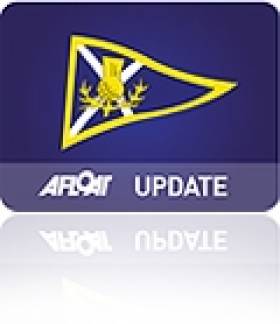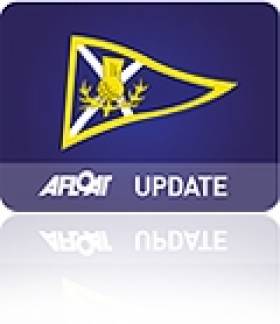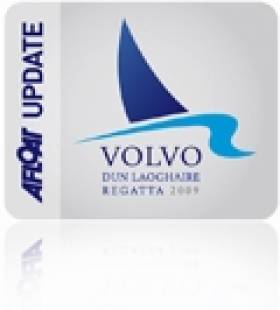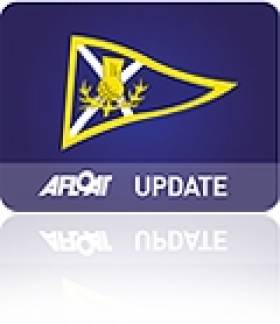Displaying items by tag: Tarbert
Irish A35 & J109 Yachts Lead Scottish Series
#scottishseries – Waterford and Dublin Bay yachts top the leaderboard of class two at Scotland's premier sailing regatta, the Silvers Marine sponsored– Scottish Series at Tarbert, as the annual event enters its final round this afternoon. Rob McConnell's A35 Fools Gold from Waterford Harbour Sailing Club leads IRC Two by a single point from the National Yacht Club's J109 Something Else, skippered by John and Brian Hall. In fourth place overall in the 14–boat fleet is former ICRA National Champion, the J109 Storm, skippered by Pat Kelly of Howth Yacht Club. Full class two results are downloadable below.
Other Irish interest from the Clyde includes Stephen Quinn's Lambay Rules lying third overall in IRC 4 where nine boats are competing.
Here's the latest available PR from the Scottish series after Day Two (Saturday): After a great second day of sailing there's still everything to play for in Silvers Marine Scottish Series. Super Saturday lived up to its name, conditions were challenging with a light southerly blowing 10 – 12 knots, but the sun shone and it was a spectacular day showing Argyll at its best.
There were plenty of thrills and spills and in IRC Class 2 Alistair Shires of Sloop John T became the first casualty of the event, after an onboard incident. Alistair swapped the waters of Loch Fyne for hospital but we're delighted to say he's fine and will be back onboard in the near future.
In IRC Class 1 Silvers Marine Scottish Series main sponsor Jamie McGarry is now leading the table having had a great day on Loch Fyne. Rod Stuart and William Ram's Aurora is just two points adrift of the top spot with Steven Cowie's Zephyr falling to third. With two races tomorrow we're looking forward to some more fierce competition on the water.
IRC 2 sees a change at the top with Sloop John T taking the top spot. The conditions suited the boat perfectly and this coupled with good tactics and handling saw them rewarded. Something Else remains in second and Kevin Aitken in Animal keep a hold of their third spot.
Moving onto the IRC Class 4 and the start of the Crewsaver course and it was Roddy Angus' Trastada who had the best day and really found their pace. They're seeing their hard work paying off following a major boat optimisation. Craig Latimer's Wildebeest V falls to second following an OCS and McVey / Darge and Black's Phoenix rises to third. The racing in this class is very tight and tomorrow's racing will be very interesting.
In CYCA Class 5 Geoff and Norman Howison's Local Hero appears to be in a class of their own. They stay well ahead of Howard Morrison in Enigma and Ian Macdonald's Significant who had an excellent day.
It's still Alan Dunnet's Valhalla of Ashton at the top of CYCA Class 6 leading Stargazer in second, while Andy Malcolm's Nemo was finding pace in third.
CYCA Class 8 Restricted Sail. The Jochr in the pack pulled a lead of two points ahead of Windhound and North Star in third. There are no discards in this class yet and Windhound could still hang in there but will have to discard a retrial.
CYCA Class 9 Restricted Sail sees Stephen Owen in Halcyon hanging on to first while John Roberts' Poppy leapfrogs Clive Reeves' Lyrebird to take third.
Sigma 33 Class and its still Harper and Robinson's Leaky Roof 2 at the top of this tightly grouped section. Gallagher and Bradshaw's Busy Beaver worked hard to take second place from James Miller's Mayrise.
In National One Design Sonata Series Steve Goacher's Eric the Boat took three firsts today to see him dominate this class. Cochrane and Galbraith's Old School, lying in second, secured three seconds while D Matthew's White Magic holds onto third.
Ovington Boats maintain their lead in the VX Class ahead of Jono and Benji Shelly's Robber's Dog, who was let off the lead, in second and Duncan Hepplewhite's Zhik who was barking up the wrong tree today in third.
The J70 Scottish Championships table stays the same with Ian Aitken in boats.com in first, Paul Heys and S Hawthorn's Jacuzzi in second and Christopher Hawforth's Django in third. These boats enjoyed a great day's sailing and Loch Fyne certainly suited them.
It's tight at the top of the Hunter 707 Class with just three points separating the first three boats. M Fleming and D Smith's Rammie leads with Carl Allen's More T Vicar with T Clark and S Parker's Black Sheep in third.
Charlie McGibney 1928 – 2014
#rip – The sea, once it casts its spell, will hold you in the net of its wonder forever. A thought that left Dublin native Charlie McGibney spellbound for his 85 years. From a very young age and through all his journeys taken over sea and land throughout his long, distinguished and caring life, Charlie took his final journey this week after he peacefully passed away at his home in Tieraclea, Tarbert, County Kerry on February 13 last.
Born in 1928 and originally from Inchicore, Mr McGibney developed and harnessed his interest and love for the sea over many years culminating in stewardship roles with many of the countries national sailing classes and associations.
Through sailing and the his maritime links and bonds, Mr McGibney is fondly remembered throughout the community, both far and wide with the esteem his presence would hold.
A founder member and former Commodore of Tarbert Island Maritime Club, Mr McGibney held a position of governor of RNLI together with a secretariat role for the Topper International Class Association.
A regional race officer with the Irish Sailing Association, Mr McGibney was very much involved with the Mermaid Class Association. A former commodore and member of Foynes Yacht Club as well as Tralee Bay Sailing Club, the avid boat builder was never far from the sea, even in his later years at his Tarbert home.
Co owner of the class winning Dehler Optima 101 yacht 'Disaray' on Ireland's west coast, Mr McGibney was also a member of the West of Ireland Off Shore Racing Association (WIORA) of which his son Simon is Commodore. He was also involved with and a member of the historic Royal Western Yacht Club of Ireland.
Most notably in 2005, aged 77, the able seaman and mariner was the leader of the assault to the Scottish Sailing Series - Tarbert to Tarbert with three generations involved.
At 85 and the beloved husband of the late Ita, Charlie McGibney peacefully passed away leaving behind a wide circle of family and friends. He is survived by daughter Carol; sons, Thomas, George, Gerard, John Raymond, Damien, Rory and Simon, inlaews, grand children and great children.
It is to the land he may lay, but it is to the sea he will look as Mr McGibney's final resting place is at St Mary's New Cemetery following requiem mass at the adjoining church in Tarbert.
Donations, if desired to the RNLI.
Ar dheis de go raibh an anam.
Festival Feel for Scotland's Biggest Sailing Series
#scottishseries – The organisers of Scotland's bigest sailnig event, the Brewin Dolphin Scottish Series at Tarbert have announced changes on and off the water at this year's event, creating a festival of sailing for competitors and spectators alike. The Clyde Cruising Club has also renewed its appeal for Irish sailors to come to Tarbert, an event Cork sailors have previously won overall.
This year's Brewin Dolphin Scottish Series will take place over the Queen's Jubilee weekend from Friday 1 June to Monday 4 June in Tarbert, Loch Fyne, on Scotland's stunning West Coast, a week later than usual.
The focus is on quality racing with three race areas on the broad waters of the Loch providing racing for IRC classes, One Design classes and CYCA (Scottish) Handicap classes (with and without spinnakers). Those taking part can also expect to see:
New courses for all classes providing variety and alternatives to standard windward/ leeward courses
The introduction of a single daytime Inshore Coastal Race on Sunday 3 June for IRC classes
The Round the Island Race on Sunday 3 June is open to all yachts with CYCA handicaps to join the Scottish Series yachts in CYCA classes to race for the day
In addition, the RS Elite Class Association is hosting the Scottish leg and first of their four Grand Slam Events at the Brewin Dolphin Scottish Series, while the Laser SB3 Class Association will hold their Scottish National Championship during the event.
Organisers also anticipate a hive of activity shoreside by concentrating activities on the north shore of Tarbert, where yachts will be berthed. Amongst various entertainment line-ups, visitors will see the marquee back in full swing. The new shoreside marquee complex will include a bar where competitors can meet, relax and socialise post racing. The daily prize-giving will also be held in the new marquee complex. Competitors and visitors can expect to continue experiencing the hustle and bustle of Tarbert throughout the Jubilee holiday weekend.
John Watson, Commodore of Clyde Cruising Club, commenting on the changes said, "We anticipate this year's Brewin Dolphin Scottish Series to be even more exciting than in previous years. It will be great to see the likes of last year's winner, Jackaroo from IRC 3, returning to defend his trophy and previous winners returning hoping to wrest it back.
"We hope for more than 100 entries and 1000 crew and supporters again this year and think the changes being made to the event structure will promote a festival of sailing on and off the water.
"We would encourage more sailors from across the UK and further afield to consider entering the event and past competitors to continue to return to the stunning waters of Loch Fyne to soak up the wonderful atmosphere Tarbert has to offer."
Irish Sea Events Offer Entry Discounts
"The way this works is that the Clyde Cruising Club are offering a 25% rebate for boats from the 4 Dun Laoghaire Clubs (DMYC, NYC, RIYC, RStGYC) that enter the Brewin Dolphin Scottish series before the expiration of the early bird discount period which expires on April 22nd explained Dun Laoghaire event secretary, Ciara Dowling.
As a reciprocal arrangement the committee of the Volvo Dun Laoghaire Regatta are offering a discount of 50% from the full entry fee to all boats that enter both regattas. To avail of this, boats must register for the early bird entry fee in the Volvo Dun Laoghaire Regatta prior to 2 May 2011. Note the 50% discount will be applied to the full entry fee rate and not the early bird rate.
To avail of this arrangement for the Scottish Series contact the Brewin Dolphin Scottish Series office for details, [email protected] 0044141 221 2774.
To avail of this arrangement for the Volvo Dun Laoghaire regatta visit the event website at www.dlregatta.org or email [email protected]
The Scottish Series takes place from 27–30 May and the Dun Laoghaire regatta from July 7th–10th 2011.
In a further boost for Dun Laoghaire sailors heading north the feeder race from Bangor to Tarbert has been re-instated.
Troon and Largs Marinas are offering competitors berthing rate discounts around Scottish Series.
Competitors from Scotland coming to Dun Laoghaire are reminded that the entry fee to the regatta includes free berthing for the duration of the event.
The official Notice of Race and Online Entry are now available at www.dlregatta.org
Scottish Series Sponsorship Continues
The Scottish Series has thrived during Brewin Dolphin's eleven year sponsorship growing awareness and numbers over the period. The event, which generates around £1 million each year for the local economy, has been running for over 30 years and attracts over 1,200 competitors to the picturesque Loch Fyne, over the May holiday weekend.
Commenting on the decision, Jamie Matheson, chairman of Brewin Dolphin, said, "We are pleased to announce our continued sponsorship of the world renowned Scottish Series. Our name has become synonymous with the event and we are delighted to be able to support it for yet another year."
Howard Morrison, Commodore of Clyde Cruising Club, event organisers, added, "The Scottish Series is a key event in the sailing calendar and we would like to thank Brewin Dolphin for their continued sponsorship of the Scottish Series. The funding will not only help develop the event, but also benefit sailing across Scotland."
Brewin Dolphin also sponsors the under 16 and under 18 youth rugby competition, the Scottish Schools Cup, which sees over 4,500 children taking part each year. As lead sponsors of both competitions, Brewin Dolphin has been able to support the drive to increase participation in both sports, whilst communicating with its target audiences.




























































